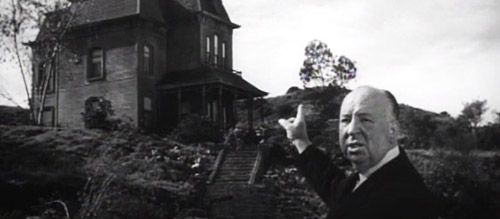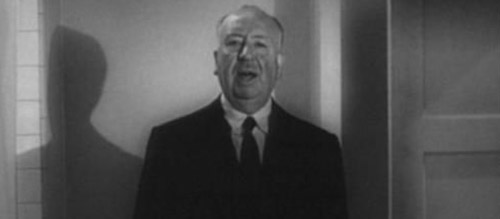The Greatest Film Trailer of All Time? Psycho (1960)
Film trailers in the contemporary space are all pretty standard and boring, especially for mainstream Hollywood productions. Action movies will have an ‘epic’ score with explosions cut between humourous one-liners; horror movies will have the occasional cut to black with a sound bridge over the top to try and increase tension before a badly-constructed jump scare; you know the drill. But for some, the trailer is a place for true filmmaking, and perhaps the most interesting case is the theatrical trailer for Alfred Hitchcock’s iconic horror Psycho (1960).
The first shock for the trailer is that it contains no footage from the film at all. Instead, director Alfred Hitchcock himself takes the viewer for a guided tour around the Bates Motel, or as it is now to be referred to as: ‘the scene of the crime’. The trailer proceeds like this. We’re taken up to the house, and introduced to the stairs, where ‘at the top of these stairs, that’s where the second murder took place.’ We are led through ‘the woman’s bedroom’, a quick glance towards the bathroom, and then escorted down to the motel. There’s a quick detour to the reception, and then across to cabin number one, which, in the bathroom, is ‘all tidied up now. Big difference. You should have seen the blood.’ Hearing the shower running, Hitchcock pulls back the curtain, to reveal Vera Miles (thought of as Janet Leigh for many years) in the shower, and at her scream, the famous logo fades into view over the screeching violins of the shower scene, and the credits roll for the feature film.
It’s an astonishing text on a variety of levels, not least of which is that Hitchcock draws a very fine line between comedy and suspense, a trademark of all his films. This is clearly evident in the music, which is a combination of Hermann’s score, and music re-used from The Trouble with Harry (dir Alfred Hitchcock, 1955), also by Bernard Hermann. The Psycho score is sinister and suspenseful, whereas the music from The Trouble with Harry is very light, jolly, and upbeat. This piece is usually played when moving from one location to another, as a theme park might pipe music on the paths between attractions. Tensions are therefore raised as Hitchcock suggests what might have happened in the woman’s bedroom, or the reception, but he soon sweeps us along to somewhere else, leaving us hanging in an amusingly frustrating fashion.
The writing of Hitchcock’s dialogue is remarkably clever. He introduces most of the plot points, such as the murder at the staircase, or the toilet where ‘an important clue was found here’, which those who have seen the film will understand. Yet the precise details of all of these things are never revealed, making it frustrating for those who haven’t. For instance, when referring to a painting in Bates’ reception, Hitchcock says that ‘this picture, has great significance, because… erm, let’s go along to cabin number 1; I want to show you something there.’ He goes through half a dozen of these moments, beginning to venture into spoiler territory, before leaving again to avoid spilling the beans.
This is both hilarious and, for anyone who hasn’t seen the film, which would have been most people at the time, incredibly suspenseful. He has piqued his audience’s interest, but hasn’t revealed anything. We know something happens, but not exactly what, and we wait for him to reveal answers as he deliberately denies the knowledge over and over again. As any student of storytelling knows, there’s a theory called ‘Chekhov’s gun’, which, roughly paraphrasing, says that if you have a gun on stage in act 1, it must go off by act 3. Nothing must be superfluous, and anything created for tension needs to pay off. Therefore, after creating comedic tension throughout the film with several of these metaphorical guns, Hitchcock needs a way to release it. Here’s where the Vera Miles shower comes into play at the end.
Recommended for you: Top 10 Alfred Hitchcock Films
By dialling down the sound just before to a quiet section of strings, once revealed, Miles’ scream pierces our ears with additional force. When the title also flashes across the screen, and Hermann’s violins screech in the background before fading into the main theme, Hitchcock has presented a well-earned jump scare. The tension the viewer has been feeling is suddenly and violently released, the shoulders relax, and the names of the cast begin to appear. Everyone has survived. Well done to all for making it through the trailer. But is this really the answer the audience has been looking for? What does someone in the shower have to do with the rest of the clues that Hitchcock has given us?
It isn’t uncommon to hear complaints that modern trailers reveal too much; it must be said that with some, you can work out most of the plot until act 3 from two minutes of footage. Hitchcock here, humorously and with lashings of satire, gives you exactly the same thing. You know that there will be at least two murders (one of which is at the top of the stairs of the house), that there’s a strange, horrible and ugly woman, and that there’s a lot of blood in the bathroom of cabin 1 from another murder. Most people would say that’s giving away an awful lot of spoilers, and yet to compound this, the trailer states that nobody is allowed into the cinema after the start of the film, which was one of the main marketing ploys to keep one of the deaths a secret, and to stop someone walking in on it without context. Hitchcock gives us a trailer, a press review, and a new short film, all in one go, whilst choosing exactly which clues to give, and how they will be given. An astonishing feat.
Trailers have used clips from scenes that never made it into the film (The Dictator did this in 2012 for example), but by and large, most of the footage is either from the film, or made to appear as if it’s from the final product. For a film to do something so radically different, unique, tongue-in-cheek, and downright incredible, is to be admired. Why don’t others follow this route? It may be purely financial reasons; fitting it into the schedule and budget would be concerning; but some larger productions would surely have the money and the time? Perhaps someone like Taiki Waititi could go off the rails and produce something similar to be memorable and stand out from the crowd; he certainly has the comedic mind for it. In any case, the theatrical trailer for Psycho is a shining outlier against an invasion of bland, monotonous, similarly-styled trailers that have become the only way films are advertised in today’s world, and a marvellous film in its own standing.




That Trailer was brilliant. It was really funny; I loved his gesticulating for the victim falling down the stairs. It was almost unexpected ASMR until the scream. Even though I knew it was coming because of the article, it was still shocking